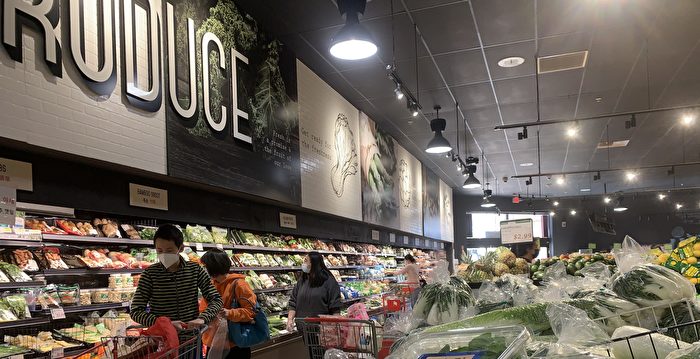[Epoch Times, April 21, 2022](Epoch Times reporter Xia Yu comprehensive report) The ongoing Russian-Ukrainian war is putting enormous pressure on the global food supply and pushing up food prices. But multiple experts say the U.S. will not experience food shortages.
Ukraine’s March grain exports were a quarter of February’s. Also as a direct result of the Russian invasion, fertilizer costs have risen by 30% since the beginning of 2022 as the prices of raw materials such as ammonia, nitrogen and nitrates have soared.
food prices rise
“This is going to be another major test of the food supply system,” Diane Charlton, an assistant professor of agricultural economics at Montana State University, told CNBC. “We’re going to have to look very carefully at the rest of the world. what is happening and consider ways to reduce the risk of food shortages and conflict.”
Meanwhile, U.S. food prices are soaring, with commodities such as wheat and corn at their highest levels in a decade. Additionally, the USDA forecasts that household food prices will rise 4% by the end of 2022.
Johanna Mendelson, a visiting professor at American University’s School of International Service, told CNBC: “This is especially serious because we’ve just recovered from a two-and-a-half-year-old disaster that had a severe impact on the prices of goods and services. recovery from the pandemic.”
Rising food bills are not just happening in the United States, but people in other major economies in Europe and Asia are also facing the same problem.
Experts don’t expect U.S. food shortages
But while prices may continue to rise, experts don’t expect food shortages in the U.S.
“It’s important to realize that the U.S. doesn’t import much from Ukraine,” Joseph Glauber, a senior fellow at the International Food Policy Research Institute, explained to CNBC.
“We’re likely to see some of the various foods on the shelves disappear as we recover from the pandemic,” Scott Irwin, chair of the agricultural marketing department at the University of Illinois at Urbana-Champaign, told CNBC. , for a while now.”
“But I can say with great confidence that in the U.S., the average consumer won’t see a shortage of bread because of what’s happening in Ukraine,” he said.
While inflation is causing some hardship for American households, there’s a difference between rising prices and a commodity being truly unavailable, reports PolitiFact.com, a nonprofit project website.
“The U.S. food system has a high self-sufficiency rate, so it’s hard to imagine grocery store shelves being empty right now,” said Seungki Lee, an agricultural economist at The Ohio State University.
Economists generally point to several drivers behind the rise in U.S. food prices, the report said. Severe weather affected harvests in South America and the US Midwest. Wages in the food industry have risen. A series of supply chain issues, from packaging to shipping, are driving up costs. The U.S. government’s cash relief program causes people to spend money, often driving up prices.
The U.S. is a net exporter of agricultural products
A key reason for the nervousness is that both Ukraine and Russia are major exporters of agricultural products, especially wheat, barley and sunflower oil. Taking wheat exports as an example, the United States and Canada ranked second and third, behind Russia, the largest wheat exporter. However, Li also said that the reduction in deliveries from Ukraine and Russia will push up global prices and the U.S. will suffer some.
“The U.S. is a net exporter of agricultural products, so if the situation worsens, we can always reduce exports,” said Jayson Lusk, an agricultural economist at Purdue University.
The rise in commodity prices caused by the war in Ukraine is worrying, but mainly in developing economies. People in parts of Africa, the Middle East and Asia will face painful consequences, the UN’s World Food Programme and the Food and Agriculture Organization have warned.
Pandemic hits China’s food system, potentially pushing up global food prices
While the Ukrainian war has dominated the discussion of food shortages, U.S. agricultural economists stress that global weather patterns remain the most critical factor.
“Good weather and good production are the main drivers of the surplus,” Lusk said.
In addition to Ukraine, Lusk is also following developments in other major producing regions, including corn regions in Brazil and Argentina, and wheat regions in the United States, Canada and Australia.
China itself can be a food price driver. Li said he was watching the impact of COVID-19 on the Chinese economy.
“If the current wave of the (virus) pandemic severely disrupts China’s food system, China will have to rely more on imports,” Li said. “They will aggressively enter the global market and expand their purchases.”
As before, that alone can drive up food prices.
Responsible editor: Li Huanyu#
